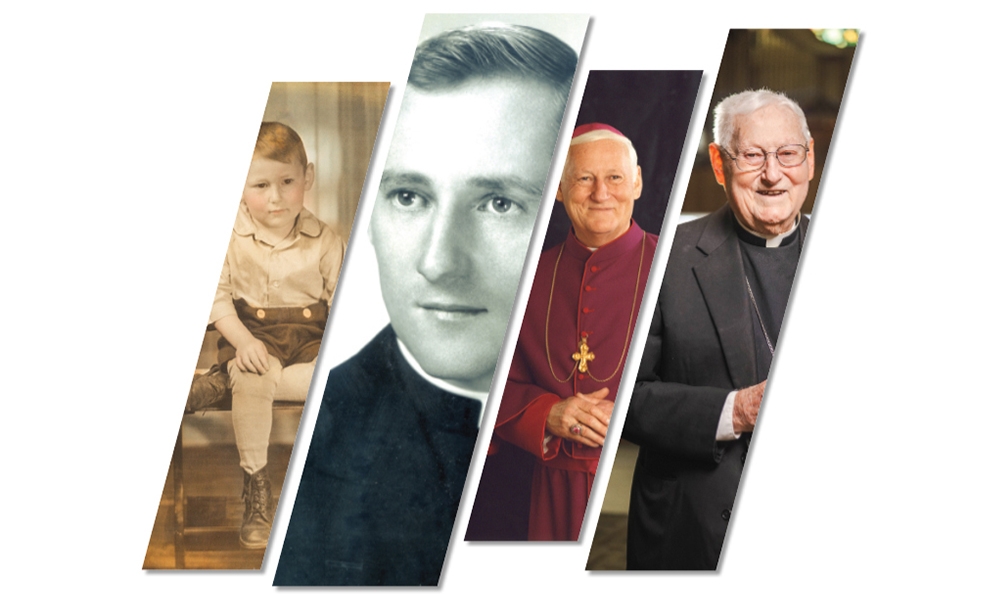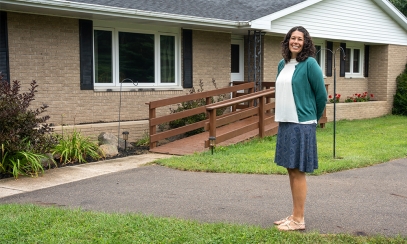
Bishop Carl F. Mengeling (1930 - 2025): A life remembered
Getting your Trinity Audio player ready...Carl Frederick Mengeling was born October 22, 1930, in Hammond, Indiana, to Carl H. and Augusta Huke Mengeling, both German immigrants. He was the second of four children. He was baptized a Catholic at the age of nine, having been raised Lutheran, and attended St. Mary Elementary School in Griffith, Indiana, graduating from Griffith High School in 1948. He then attended St. Meinrad College and Seminary in Indiana.
Carl Frederick Mengeling was born October 22, 1930, in Hammond, Indiana, to Carl H. and Augusta Huke Mengeling, both German immigrants. He was the second of four children. He was baptized a Catholic at the age of nine, having been raised Lutheran, and attended St. Mary Elementary School in Griffith, Indiana, graduating from Griffith High School in 1948. He then attended St. Meinrad College and Seminary in Indiana.
Bishop Mengeling was ordained a priest by Bishop Andrew G. Grutka, May 25, 1957, at the Cathedral of the Holy Angels in Gary, Indiana, and served as associate pastor of St. Mark Parish, Gary, from 1957–1961. He was then sent to Rome for advanced studies and received a License in Sacred Theology from the Angelicum University and a Doctorate in Sacred Theology from the Alfonsianum Academy. He served as a page during the Second Vatican Council sessions.
Upon his return to the States in 1964, Bishop Mengeling taught at Bishop Noll High School in Hammond, St. Joseph Calumet College in East Chicago, Indiana, and St. Procopius Seminary in Lisle, Illinois.
The bishop served as pastor of All Saints Parish in Hammond from 1968–1970, Holy Name Parish in Cedar Lake from 1970-1971, Nativity of Our Savior in Portage 1971-1985, and St. Thomas More Parish in Munster 1985-1995.
On November 7, 1995, Bishop Mengeling was appointed to succeed Kenneth J. Povish as Bishop of Lansing and was ordained bishop on January 25, 1996 at St. Mary Cathedral, Lansing, by Cardinal Adam Maida. Bishop Mengeling chose the words of St. John the Baptist as his episcopal motto “He must increase!”.
Bishop Mengeling focused initially on implementing Pope John Paul the Great’s apostolic letter Tertio Millennio Adveniente, preparing the entire diocese for the third millennium of Christianity, which included the creation of the Office of Pastoral Planning which was inaugurated at the Chrism Mass in 1999.
The nationally award-winning magazine, Faith, was instituted in January 2000 as a means of helping people deepen their faith in Jesus Christ.
In 1999, Bishop Mengeling met with the diocese’s Knights of Columbus leadership and shared his vision for a special center for youth on the campus of St. Francis Retreat Center in DeWitt.
Bishop Mengeling faced some very difficult times as bishop. In 2000, he issued a sexual abuse policy even before the national sexual abuse scandal of 2002. The Bishop instituted in 2003, the Virtus program in the diocese as part of an effort to create a safe environment for children and young people. He was also a part of the healing retreats offered at St. Francis Retreat Center for victims of sexual abuse.
Vocations were always a priority for him and he commissioned 96 lay ecclesial ministers, and ordained 43 permanent deacons and 33 priests. Bishop Mengeling also presided at the first final professions of the Servants of God’s Love and the Dominican Sisters of Mary, Mother of the Eucharist. He served for a number of years on the United States Conference of Catholic Bishops subcommittees on the permanent diaconate, priestly formation, and campus ministry.
The bishop was a strong supporter of Catholic Schools and appointed priest chaplains to all four diocesan high schools to ensure solid Catholic identity and deepened spiritual life. Bishop Mengeling encouraged pastors to build new churches and himself dedicated 12 churches, three new altars, six chapels at diocesan institutions, a perpetual adoration chapel in Lansing, two mausoleums, three education centers, and a family center.
He was aware of the needs of minorities and joined the celebrations when the Hispanic parishes in Lansing and Flint opened their new facilities. He also created Saint Andrew Dung Lac Vietnamese parish in 1998. Bishop Mengeling joined the Black Catholic Community in rejoicing at the opening of their new church in Flint, in 2002.
Bishop reached out to minorities and groups often forgotten in our society. He celebrated Mass for inmates in county, state and federal facilities. He frequently went to the migrant camps to celebrate the sacraments for farm laborers. Bishop celebrated his 50th anniversary to the priesthood on October 16, 2007, but the celebration was delayed because of the discovery of bladder cancer and subsequent surgery.
In his retirement, he returned to his love of teaching, offering classes in Sacred Scripture to the novices of the Dominican Sisters of Mary, Mother of the Eucharist and the Sisters of Mercy, both in Ann Arbor. He also gave parish missions and was sought after as a retreat master for seminarians, priests and religious across the country, even in Germany and Rome.
Bishop Mengeling died in the early hours of July 1, 2025, in Mother Teresa House for the Care of the Terminally Ill in Lansing. We mourn his loss alongside his family, the lay faithful and the clergy of the Diocese of Lansing. He is survived by his sister Carolyn (Milan) Tomich and brother William, both of Crown Point, Indiana, and several nieces and nephews.
In place of flowers, Bishop Mengeling has requested that donations be made to Catholic Charities of the Diocese of Lansing.



